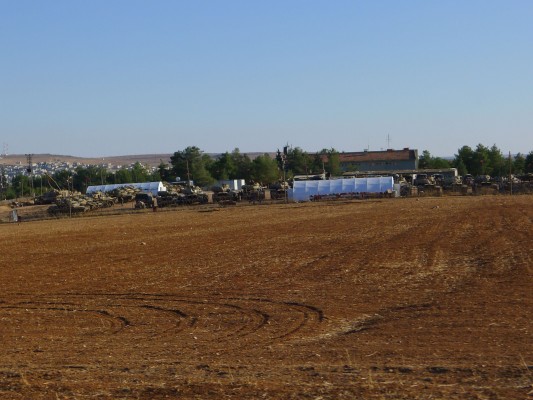Turkey Has a Good Reason to Sit Out the Third American-Iraqi War
Roy Gutman
Turkish tanks parked in a lot near the border with Syria on Tuesday, Sept. 30, 2014. The northern Syrian city of Kobani, under siege from Islamic militants, is in the background. (Courtesy Guy Gurman via TNS)
November 20, 2014

What do Turks, Kurds, Syrian Arabs and Iraqi Arabs have in common? They were once part of the same country, the Ottoman Empire. Today, one of these groups is not like the others—the Kurds did not get a state when the empire was broken up by Britain and France after World War I. The Sykes-Picot borders of the Middle East are without a doubt instigators of conflict, but the Islamic State is trampling those colonial borders. They’ve erased the line between Iraq and Syria, and their controlled territory stretches right to the Turkish frontier. Turkey is a NATO ally, and much of NATO is at war with the Islamic State, including the United States and Britain. The United States has a vested interest in getting Turkey to commit troops and airpower to the conflict, but they didn’t the last time we invaded Iraq and probably won’t this time either. Why don’t they want to get involved? The answer is the Kurds.
The Turkish government is not convinced that the Islamic State is the greatest threat to Turkey, but knows that Kurdish nationalism is. Turkey is almost a fifth Kurdish according to the CIA World Factbook, and any potential Kurdish nation state worth its salt is going to claim the Turkish/Syrian borderlands as part of its territory. Right now, the most likely “Kurdistan” to emerge is in Iraq, where the Kurdistan Regional Government is de facto independent from Baghdad. Turkey has fought Kurdish insurgency before, and an independent Kurdistan would not only embolden separatists but probably support them financially as well. If Turkey fights the Islamic State, they remove a potential threat, Islamists, and bolster another, Kurdish nationalists, be they in Iraq, Syria or Turkey itself. Simply speaking, the Islamic State and the Kurds are enemies of one another, and Turkey doesn’t want to commit to defeating the former because it would help the latter more than it would help Turkey.
The Turkish-Kurdish situation is complex, and the ongoing war south of the border has made things worse. The armed wing of the Kurdistan Workers’ Party (PKK), which is based in Turkish-controlled Kurdistan, is designated as a terrorist organization by all of NATO. The PKK has sent fighters over the Turkish border into Syria to protect the Kurdish population and fight the Islamic State, something that bothers Turkey perhaps more than Europeans are bothered by their citizens going to fight for the Islamic State. Then there are the Iraqi Kurds, loyal U.S. allies who also undermine the unity of the rump state they are nominally a part of. If the Islamic State is defeated, it improves the position of all Kurds in the region, which would threaten Turkey.
Turkish neutrality makes perfect sense from Ankara’s perspective, and in a Hobbesian world, we would be content to let it be since there is nothing compelling them to act otherwise. But we don’t, and that’s where the problem comes in for our military-industrial planners. Turkey is a NATO member, and most of NATO, led by the United States, has committed to fighting the Islamic State, in both Iraq and Syria. Turkey directly borders this new country that we are trying to destroy. From an American perspective, Turkey should naturally be involved in fighting our latest enemy, over whom we have unprecedented moral high ground. Not since the Cold War has the United States had an enemy so diametrically opposed to us—a Western secular democracy is at war with a Middle Eastern jihadist kleptocracy. Turkey is also legally secular and a democracy, presumably making the Islamic State their ideological antithesis as well.
Any assistance from Turkey, but especially ground troops would be decisive in fighting the Islamic State. The battle for air superiority was a non-event, but it is supplementary to the ability of troops to capture and hold positions. It is often said that guns don’t kill people but rather people with guns do. Similarly, airplanes don’t win wars but armies with them do. This poses its own moral questions for the United States, however. Should Middle Eastern troops be committed to death in combat while Westerners comfortably fly their drones and jet planes over the Islamic State? We are right to value the lives of our own soldiers, but it is transparently Machiavellian to pressure foreign armies to die for our objectives. I consider myself an exceptionally cynical person, but there’s something emphatically wrong here. President Barack Obama, who approved funding and training of Syrian rebels and wants to avoid the “boots on the ground” approach that his neoconservative predecessors took in the region, seems to like the idea of having the indigenous fight on our behalf, as dead Syrians will not hurt his popularity. But what of the Turkish military? It would seem that the Ottomans are not for sale.












